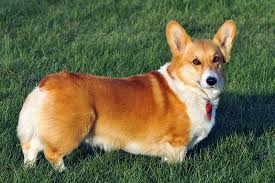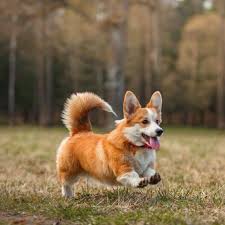The Pembroke Welsh Corgi is a delightful and unique breed of dog. Known for their long, low profile and happy demeanor, Corgis have captured the hearts of many people around the world. In this article, we’ll take a closer look at the history, personality, and characteristics of this beloved breed, as well as offer some tips for anyone considering adding a Corgi to their family.
First, let’s dive into the history of the Pembroke Welsh Corgi. This breed is believed to have originated in Wales, where they were used as herding dogs for cattle and sheep. The breed’s name comes from the Welsh words “cor” meaning dwarf and “gi” meaning dog. In Welsh folklore, it was said that Corgis were the preferred mounts of fairies and that the markings on their fur were the result of the fairy’s harnesses.
Despite their diminutive size, Corgis were highly valued for their herding abilities, which they demonstrated by nipping at the heels of their charges. This instinct is still present in many Corgis today, and owners should be prepared to train their dog not to nip at people or other animals.
Now, let’s talk about the personality of the Pembroke Welsh Corgi. Corgis are known for their playful and affectionate nature. They love to be around people and are often described as “velcro dogs” because they like to stick close to their owners. They are also highly intelligent and can be trained to perform a variety of tasks, including agility and obedience competitions.
One of the most distinctive features of the Pembroke Welsh Corgi is their appearance. They have a long, low profile with short legs and a fluffy tail. Their ears are erect and pointed, and their fur is usually a mix of white, black, and tan. Corgis shed heavily, so owners should be prepared to brush their dog regularly to avoid matting and hairballs.
If you’re considering adding a Pembroke Welsh Corgi to your family, there are a few things to keep in mind. First, Corgis are active dogs that require regular exercise to stay healthy and happy. They also tend to be vocal and can bark excessively if not properly trained. Finally, as herding dogs, they may have a strong instinct to chase and nip at other animals, including smaller dogs and cats.
The Pembroke Welsh Corgi is a delightful and unique breed of dog that has captured the hearts of many people around the world. With their playful and affectionate nature, distinctive appearance, and herding abilities, Corgis make great companions for families and individuals alike.
If you’re considering adding a Corgi to your family, be prepared to provide plenty of love, exercise, and training to ensure a happy and healthy relationship with your furry friend.
Read Also: Healing Powers and Health Benefits of Tilapia Fishes
History and Origin of the Pembroke Welsh Corgi

The Pembroke Welsh Corgi is a breed of dog that originated in Wales. The breed is believed to have descended from the same family of dogs as the Swedish Vallhund, which were brought to Wales by the Vikings during their invasions in the 9th and 10th centuries.
Corgis were originally bred for their herding abilities, particularly for cattle and sheep. The breed’s small size allowed them to easily navigate between the legs of larger animals while nipping at their heels to keep them in line. The name “Corgi” is derived from the Welsh words “cor” meaning dwarf and “gi” meaning dog, which describes the breed’s diminutive stature.
There are two types of Corgis: the Pembroke Welsh Corgi and the Cardigan Welsh Corgi. The Pembroke is the more popular of the two, and is believed to have descended from the same family as the Dachshund, Basset Hound, and other low-to-the-ground breeds. The Cardigan, on the other hand, is believed to be descended from the same family as the Dalmatian and the Welsh Sheepdog.
The Pembroke Welsh Corgi was first recognized by the American Kennel Club in 1934, and has since become a beloved breed around the world. Despite being bred primarily as a herding dog, the Corgi’s cheerful and outgoing personality has made them popular as family pets and companions. They have also been trained to perform a variety of tasks, including search and rescue, agility, and obedience competitions.
Today, the Pembroke Welsh Corgi remains a popular breed of dog, with their distinctive appearance and friendly demeanor endearing them to many people. While they may no longer be used for herding as much as they once were, their intelligence and trainability make them well-suited for a variety of tasks and activities.
Health Issues and Lifespan of Pembroke Welsh Corgi Dogs

Like all dog breeds, the Pembroke Welsh Corgi is susceptible to certain health issues. It is important for potential owners to be aware of these issues and take preventative measures to ensure their Corgi stays healthy.
One of the most common health issues in Corgis is obesity. Due to their love of food and relatively sedentary lifestyle, Corgis can easily become overweight if not given proper exercise and diet. Obesity can lead to a range of health problems, including joint issues, heart disease, and diabetes. Therefore, it is important to monitor your Corgi’s weight and provide them with regular exercise and a healthy diet.
Another health issue that can affect Corgis is hip dysplasia. This condition occurs when the hip joint does not develop properly, which can lead to pain and arthritis later in life. The best way to prevent hip dysplasia is to purchase a Corgi from a reputable breeder who has screened their breeding dogs for this condition. Regular exercise and maintaining a healthy weight can also help prevent hip dysplasia.
Other health issues that can affect Corgis include allergies, eye problems, and spinal issues. It is important to provide your Corgi with regular check-ups with a veterinarian to catch any potential health issues early and treat them promptly.
The average lifespan of a Pembroke Welsh Corgi is between 12 and 15 years. However, like all dogs, the lifespan of a Corgi can be affected by a variety of factors, including genetics, lifestyle, and health. Providing your Corgi with regular exercise, a healthy diet, and proper veterinary care can help ensure a long and healthy life for your furry friend.
While the Pembroke Welsh Corgi is generally a healthy breed, they can be susceptible to certain health issues. Owners should be aware of these issues and take preventative measures to ensure their Corgi stays healthy. With proper care and attention, a Corgi can live a long and happy life as a beloved companion.
Read Also: 10 Unique Advantages of Tilapia Fish Farming
Pembroke Welsh Corgi Dog Breed Complete Grooming and Care Guide
Regular grooming: Corgis have a thick, double coat that sheds seasonally. To keep your Corgi’s coat healthy and shiny, they should be brushed at least once a week. During shedding season, brushing should be done more frequently to prevent matting and tangling. A slicker brush and metal comb are recommended for grooming a Corgi.
Bathing: Corgis do not require frequent bathing, as this can strip the natural oils from their skin and coat. However, if your Corgi gets particularly dirty or smelly, they can be bathed with a mild dog shampoo. It is important to dry your Corgi thoroughly after bathing to prevent skin infections.
Nail trimming: Corgis have strong nails that can grow quickly if not trimmed regularly. You should aim to trim your Corgi’s nails every four to six weeks, or as needed. If you are unsure how to trim your Corgi’s nails, a professional groomer or veterinarian can show you how.
Dental care: Corgis are prone to dental issues, so it is important to establish a dental care routine early on. This includes regular teeth brushing, offering dental chews or toys, and annual dental check-ups with a veterinarian.
Exercise: While Corgis may have short legs, they still require daily exercise to keep them healthy and happy. This can include walks, playtime in the yard, or even agility training. Aim for at least 30 minutes of exercise each day, but be mindful not to over-exert your Corgi.
Training: Corgis are intelligent and eager to please, making them easy to train. Positive reinforcement training methods work best for Corgis, and consistency is key. Training should be ongoing throughout your Corgi’s life to keep their minds active and prevent behavior issues.
Health care: In addition to regular grooming and exercise, your Corgi should receive annual check-ups with a veterinarian. This includes vaccinations, parasite prevention, and routine blood work. It is also important to monitor your Corgi for any signs of illness or injury and seek veterinary care promptly if needed.
In conclusion, caring for a Pembroke Welsh Corgi requires regular grooming, exercise, dental care, training, and veterinary care. By providing your Corgi with proper care and attention, you can help ensure they live a long and healthy life as a beloved companion.
Read Also: The Importance of a Laboratory in Science Education
